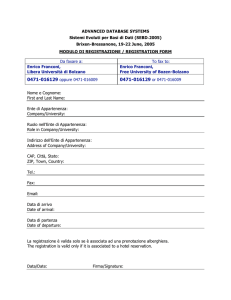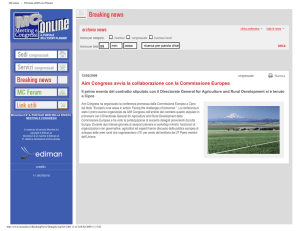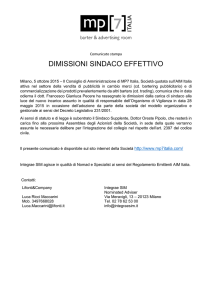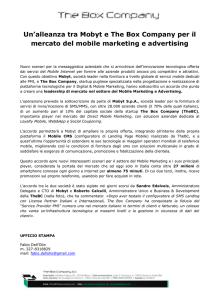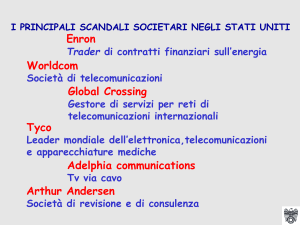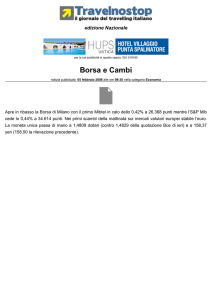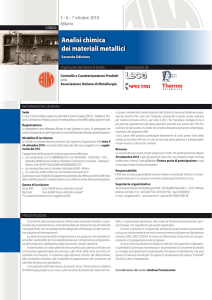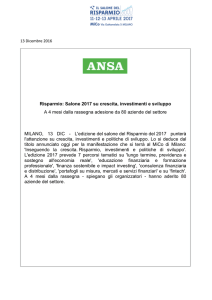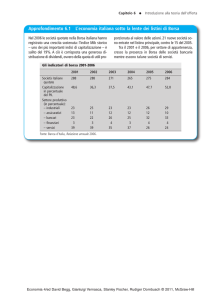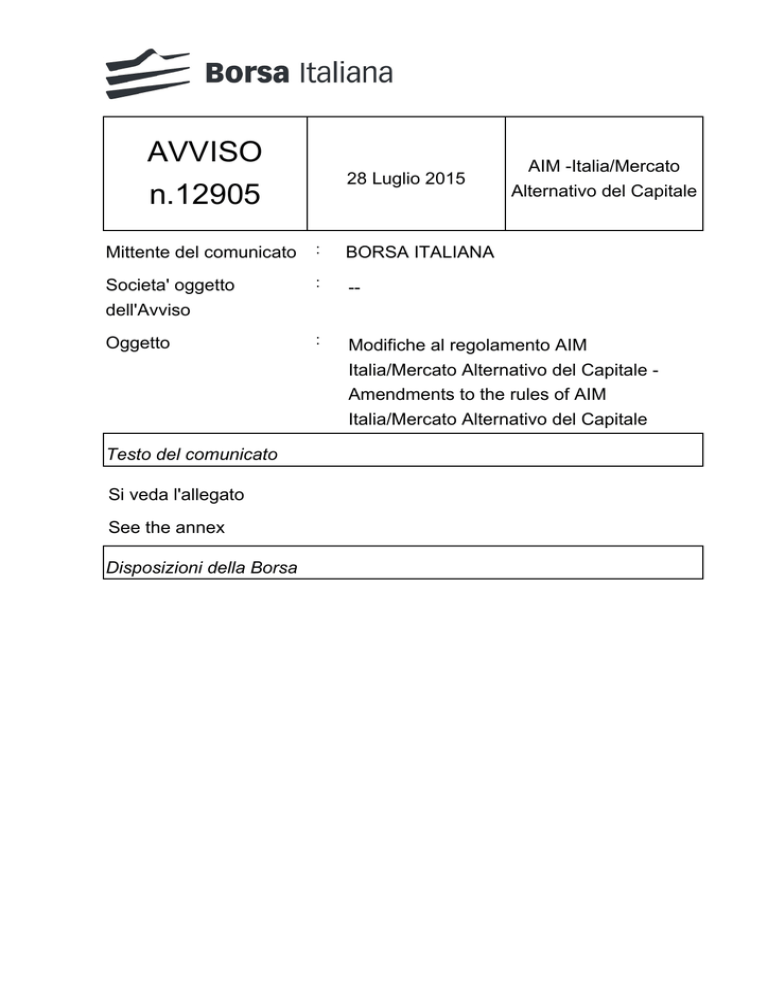
AVVISO
n.12905
28 Luglio 2015
AIM -Italia/Mercato
Alternativo del Capitale
Mittente del comunicato
:
BORSA ITALIANA
Societa' oggetto
dell'Avviso
:
--
Oggetto
:
Modifiche al regolamento AIM
Italia/Mercato Alternativo del Capitale Amendments to the rules of AIM
Italia/Mercato Alternativo del Capitale
Testo del comunicato
Si veda l'allegato
See the annex
Disposizioni della Borsa
MODIFICA AL REGOLAMENTO EMITTENTI DEL MERCATO AIM ITALIA/MERCATO ALTERNATIVO DEL
CAPITALE
–
RECEPIMENTO DELLA DIRETTIVA AIFMD
OPA ENDOSOCIETARIA – FINE TUNING
Le modifiche illustrate nel presente Avviso entrano in vigore il 31 agosto 2015.
1. Recepimento della direttiva AIFMD
Nel mese di febbraio è giunto a completamento il processo di recepimento in Italia delle
disposizioni contenute nella Direttiva 2011/61/UE (AIFMD), che si è posta l’obiettivo di ridefinire
il perimetro regolamentare applicabile al risparmio gestito, disciplinando in modo uniforme, a
livello europeo, aspetti che in precedenza erano lasciati alla discrezionalità delle singole
legislazioni nazionali.
Come noto, la AIFMD introduce nell’ordinamento comunitario un regime normativo volto a
promuovere una maggiore integrazione del mercato europeo del risparmio gestito e, in
particolare, degli investimenti alternativi, attraverso una disciplina applicabile ai gestori (GEFIA)
di Fondi Alternativi di Investimento (FIA). L’introduzione di tale categoria è stata suggerita
dall’esigenza di standardizzazione e razionalizzazione dei veicoli d’investimento, a fronte di una
situazione eterogenea e non regolamentata a livello primario, sia con riferimento alle forme
societarie che potevano presentare questi veicoli, sia con riferimento ai conseguenti luoghi di
negoziazione.
Ora, pertanto, i veicoli d’investimento inquadrabili nella categoria dei FIA trovano nella direttiva
europea, così come recepita nel nostro ordinamento, una compiuta disciplina, la quale rende
superflua l’introduzione di regole ulteriori da parte del gestore di un mercato. La direttiva
richiamata si occupa, infatti, di fissare requisiti in materia di politica di investimento, gestione dei
conflitti di interesse, termini entro i quali effettuare investimenti significativi e caratteristiche di
esperienza e indipendenza del management.
A fronte di tale quadro normativo, si è, anzitutto, introdotta la definizione di FIA, la quale
ricomprende il fondo comune d’investimento mobiliare o immobiliare, la Sicav e la Sicaf
rientranti nell’ambito di applicazione della direttiva 2011/61/UE. Si è, inoltre, ritenuto opportuno
escludere, ai fini dell’ammissione dei FIA, ogni requisito ulteriore all’autorizzazione, compreso
quello della raccolta minima di 3 milioni di Euro.
Si è reso, altresì, necessario chiarire il regime applicabile alle attuali società di investimento,
laddove quest’ultime non abbiano richiesto l’autorizzazione come FIA: esse, che rimangono
negoziate sull’AIM, verranno disciplinate dalle regole vigenti in particolare in materia di reverse
take-over e cambiamenti sostanziali del business. Si prevede, d’altro canto, che, dall’entrata in
vigore delle modifiche in tema di FIA, non potranno essere ammesse alle negoziazioni società
d’investimento non autorizzate come FIA (fatta eccezione per le SPAC).
Si precisa, infine, che continuano ad essere negoziate sull’AIM, nonché ad essere ammesse
alle negoziazioni, le SPAC, le quali rimangono assoggettate all'attuale disciplina.
1
Si delineano, allora, quattro scenari:
1. il regime “FIA”:
- nessun requisito per l’ammissione (salvo l’autorizzazione come FIA)
- assoggettamento, per quanto riguarda gli obblighi post ammissione, alla
disciplina comune e non più a disposizioni specifiche;
2. il regime “emittenti AIM Italia ammessi alle negoziazioni prima della data di entrata in
vigore delle disposizioni in tema di FIA che non hanno richiesto la relativa
autorizzazione”:
- non sono consentite nuove ammissioni secondo le disposizioni attualmente
previste per le società di investimento;
- vengono confermati gli obblighi post ammissione previgenti inerenti la definizione
di una politica d’investimento, il reverse take over, le disposizioni in tema di
amministratori e titolari di deleghe di gestione;
3. il regime “SPAC”:
- sono confermarti la raccolta minima di 3 milioni di euro in denaro e gli obblighi
post ammissione previsti per i soggetti di cui al punto 2. (quindi, obblighi delle
“società d’investimento”).
4. soggetti nuovi “non FIA”:
- resta inteso che le Holding di partecipazione e le società immobiliari e altri
soggetti non FIA saranno ammesse secondo la procedura ordinaria per gli
emittenti AIM Italia.
Infine, sempre in ragione dell’avvenuto recepimento della AIFMD, si modifica il Regolamento
degli operatori e delle negoziazioni, prevedendo che gli operatori ammessi al mercato non
possano negoziare strumenti emessi da FIA riservati su ordine di soggetti diversi dagli
Investitori Professionali.
Al fine di assicurare ai gestori di FIA riservati un presidio per evitare la sottoscrizione delle quote
o azioni da parte degli investitori c.d. retail si inserisce quindi una nuova regola di condotta
degli operatori. In particolare, si vieta, per gli strumenti finanziari emessi da FIA riservati,
l’accettazione di ordini provenienti, anche indirettamente, da investitori diversi da quelli
professionali. A tal fine, si prevede che l’operatore si impegni a far rispettare analoga regola a
tutti i soggetti che prima di lui abbiano trattato l’ordine, in modo tale che venga coperta
interamente l’eventuale catena di intermediazione. La società di gestione del mercato, infatti,
non è nelle condizioni di identificare il committente (pur essendo ciascun ordine classificato
secondo la tipologia di fonte: ad es., operatore del mercato che negozia per conto proprio,
investitore professionale, investitore retail). L’esclusiva responsabilità per le attività di verifica
concernenti le diverse categorie di investitore che possono accedere al FIA rimane, pertanto, in
capo al raccoglitore di ordini, sia esso partecipante al mercato oppure soggetto diverso.
2
In aderenza all’art. 14 del decreto ministeriale n. 30 del 2015, si prevede, infine, che, ove lo
statuto o il regolamento del FIA lo consenta, possano essere accettati anche ordini provenienti
da investitori retail, purché d’importo complessivo pari ad almeno cinquecentomila euro.
2. Opa endosocietaira – fine tuning
Tra i requisiti di ammissione degli emittenti nel mercato AIM Italia è previsto l’inserimento nello
statuto di una clausola di offerta pubblica di acquisto endosocietaria.
In particolare, alle società ammesse nell’AIM Italia/Mercato Alternativo del Capitale è richiesto di
rendere applicabili per richiamo effettuato a statuto le disposizioni relative alle società quotate di
cui al Testo Unico della Finanza ed ai regolamenti Consob di attuazione in materia di offerta
pubblica di acquisto e di scambio obbligatoria (limitatamente agli artt. 106 e 109 TUF).
Tutte le controversie relative all’interpretazione ed esecuzione della clausola devono essere
preventivamente sottoposte, come condizione di procedibilità, al collegio di probiviri denominato
‘Panel’.
Le Società, i loro azionisti e gli eventuali offerenti possono adire il Panel per richiedere la sua
interpretazione preventiva e le sue raccomandazioni su ogni questione che potesse insorgere in
relazione all’offerta pubblica di acquisto. Il Panel risponde ad ogni richiesta oralmente o per
iscritto, entro il più breve tempo possibile, con facoltà di chiedere a tutti gli eventuali interessati
tutte le informazioni necessarie per fornire una risposta adeguata e corretta.Per maggiore
chiarezza, si specifica che gli onorari dei componenti il Panel sono a carico dei soggetti
richiedenti sopraindicati.
***
Il testo del Regolamento del mercato AIM Italia sarà reso disponibile sul sito Internet di Borsa
Italiana, all’indirizzo www.borsaitaliana.it.
Di seguito si evidenziano le modifiche apportate.
REGOLAMENTO EMITTENTI
Parte Prima – Regolamento
omissis
3
FIA, società costituite con lo scopo di acquisizione di un business specifico e società di
investimento
8.
Possono essere ammesse alle negoziazioni sul mercato AIM Italia i FIA e le società
costituite con lo scopo di acquisizione di un business specifico. Limitatamente a
queste ultime, l’emittente Laddove l’emittente sia una società di investimento, ai fini
dell’ammissione, deve raccogliere un minimo di 3 milioni di Euro in denaro tramite un
collocamento che si concluda alla data di ammissione ovvero in prossimità
dell’ammissione stessa.
Ai fini degli obblighi post ammissione previsti dal presente Regolamento e come da
definizione contenuta nel Glossario, per società di investimento si intende
l’emittente AIM Italia ammesso alle negoziazioni prima della data di entrata in vigore
delle disposizioni in tema di FIA [31 agosto 2015] che non ha richiesto la relativa
autorizzazione o una società costituita con lo scopo di acquisizione di un business
specifico. Resta inteso che, viceversa, i FIA rimangono assoggettati alla sola
disciplina derivante dalla direttiva 2011/61 (c.d. AIFMD).
Una società di investimento deve definire e perseguire una politica di investimento.
Una società di investimento deve ottenere la preventiva approvazione degli azionisti
convocati in assemblea per qualsiasi cambiamento rilevante alla propria politica di
investimento.
Qualora una società di investimento non abbia dato sostanziale attuazione alla propria
politica di investimento entro 24 mesi dall’ammissione, la società dovrà ottenere
l’approvazione dagli azionisti alla prima assemblea utile e, in seguito, ogni anno, fino a
quando non vi abbia dato sostanziale attuazione.
Omissis
Scheda Sei
Clausola in materia di offerta pubblica di acquisto da inserire negli statuti delle società
AIM Italia
omissis
4
Il Panel è un collegio di probiviri composto da tre membri nominati da Borsa Italiana che
provvede altresì a eleggere tra questi il Presidente. Il Panel ha sede presso Borsa Italiana.
I membri del Panel sono scelti tra persone indipendenti e di comprovata competenza in materia
di mercati finanziari. La durata dell’incarico è di tre anni ed è rinnovabile per una sola volta.
Qualora uno dei membri cessi l’incarico prima della scadenza, Borsa Italiana provvede alla
nomina di un sostituto; tale nomina ha durata fino alla scadenza del Collegio in carica. Le
determinazioni del Panel sulle controversie relative all’interpretazione ed esecuzione della
clausola in materia di offerta pubblica di acquisto sono rese secondo diritto, con rispetto del
principio del contraddittorio, entro 30 giorni dal ricorso e sono comunicate tempestivamente alle
parti. La lingua del procedimento è l’italiano. Il Presidente del Panel ha facoltà di assegnare, di
intesa con gli altri membri del collegio, la questione ad un solo membro del collegio.
Le Società, i loro azionisti e gli eventuali offerenti possono adire il Panel per richiedere la sua
interpretazione preventiva e le sue raccomandazioni su ogni questione che potesse insorgere in
relazione all’offerta pubblica di acquisto. Il Panel risponde ad ogni richiesta oralmente o per
iscritto, entro il più breve tempo possibile, con facoltà di chiedere a tutti gli eventuali interessati
tutte le informazioni necessarie per fornire una risposta adeguata e corretta. Il Panel esercita
inoltre i poteri di amministrazione dell’offerta pubblica di acquisto e di scambio di cui alla
clausola in materia di offerta pubblica di acquisto, sentita Borsa Italiana.
Anche in difetto di una previsione statutaria in materia di spese, gli onorari dei membri
del Panel sono posti a carico del soggetto richiedente.
Glossario
FIA
Indicano il fondo comune investimento
mobiliare o immobiliare, la Sicav e la Sicaf
rientranti nell’ambito di applicazione della
direttiva 2011/61/UE;
5
politica di investimento
La politica che una società di investimento deve
perseguire in materia di investimenti e livello di
diversificazione dei rischi.
La politica deve essere sufficientemente precisa e
dettagliata in modo da consentirne la valutazione
e, ove applicabile, comprendere il significato di
qualsiasi cambiamento proposto alla stessa.
Deve contenere come minimo:
il tipo di settore (o settori) di business,
l’area geografica (o aree geografiche) e il
tipo di attività o società nelle quali può
investire;
i mezzi o la strategia con i quali perseguire
la politica di investimento;
se intende operare come investitore attivo
o passivo e, ove applicabile, la durata
prevista per ciascun investimento;
il livello di diversificazione degli
investimenti e i limiti massimi di
esposizione, ove applicabili;
la propria politica in materia di
indebitamento e partecipazioni reciproche,
ove applicabile;
informazioni dettagliate circa eventuali
limiti in materia di investimenti; e
la natura del rendimento previsto per gli
azionisti e, ove applicabile, per quanto
tempo la società di investimento può
continuare ad esistere prima di fare un
investimento e/o prima di dover procedere
al rimborso dei conferimenti agli azionisti.
6
società di investimento
L’emittente
AIM
Italia
ammesso
alle
negoziazioni prima della data di entrata in
vigore delle disposizioni in tema di FIA [31
agosto 2015] che non ha richiesto la relativa
autorizzazione o una società costituita con lo
scopo di acquisizione strategica di un
business specifico
che ha come propria
attività principale o scopo, quello di investire i
propri fondi in strumenti finanziari, attività
commerciali o attivi di qualsiasi tipo.
soggetto titolare di deleghe di gestione
o “investment manager”
Qualsiasi soggetto, esterno alla società di
investimento, che svolge attività di gestione degli
investimenti per conto della società stessa. La
definizione include anche un consulente che
fornisca all’investment manager o alla società di
investimento pareri in materia di scelte di
investimento.
Omissis
Articolo 8: Società di investimento
Società costituite con lo scopo di acquisizione di un business specifico e società di
investimento ammesse alle negoziazioni prima della data di entrata in vigore delle
disposizioni in tema di FIA [31 agosto 2015] che non hanno richiesto la relativa
autorizzazione
La politica di investimento deve essere sufficientemente precisa e dettagliata in modo da
essere chiara e specifica. La politica di investimento deve essere descritta nel documento di
ammissione e in ogni successiva relazione relativa alla politica di investimento, ad esempio
in base agli articoli 8,14 o 15. La politica di investimento deve essere regolarmente
comunicata e almeno descritta nei bilanci o nei rendiconti annuali della società di
investimento.
La relazione da sottoporre all’assemblea degli azionisti al fine di ottenere l’approvazione ad una
modifica della politica di investimento deve contenere informazioni adeguate sulla politica di
investimento attuale e su quella proposta, sulle ragioni e sulle prevedibili conseguenze di ogni
cambiamento proposto. La stessa deve anche contenere le informazioni richieste dall’art. 4.2
delle Disposizioni di Attuazione AIM Italia per le Società di investimento.
7
Omissis
Disposizioni di attuazione
per le società di investimento
Omissis
1.
Introduzione
Queste disposizioni di attuazione si applicano all’emittente AIM Italia ammesso alle negoziazioni prima
della data di entrata in vigore delle disposizioni in tema di FIA [31 agosto 2015] che non ha richiesto la
relativa autorizzazione e all’emittente AIM Italia che sia costituito con lo scopo di acquisizione
strategica di un business specifico (i.e. “special purpose acquisition companies”, etc). Esse contengono
specifici requisiti regolamentari, indicazioni interpretative e linee guida in tema di società di
investimento. Esse formano parte integrante del Regolamento Emittenti (e rientrano nella definizione
di Disposizioni di attuazione all’interno del Regolamento) e del Regolamento Nominated Advisers.
Per chiarezza, si precisa che quando un emittente pubblica un Prospetto, trovano applicazione sia la
normativa Prospetto sia il Regolamento Emittenti.
Se un nominated adviser ritiene che queste disposizioni di attuazione non siano applicabili o
appropriate in relazione ad un particolare emittente AIM Italia, Borsa Italiana dovrà essere contattata.
I termini in grassetto utilizzati in questa nota hanno generalmente lo stesso significato utilizzato nel
Regolamento Emittenti, salvo sia stabilito altrimenti.
2.
“Società di investimento”
Il Regolamento Emittenti contiene la definizione di “società di investimento”, ossia l’emittente AIM
Italia che ha come propria attività principale o scopo, quello di investire i propri fondi in strumenti
finanziari, attività commerciali o attivi di qualsiasi tipo. Borsa Italiana dovrebbe essere consultata
qualora vi sia qualche dubbio in merito all’opportunità di qualificare un emittente che richiede
l’ammissione o un emittente AIM Italia come una società di investimento.
La definizione di società di investimento include le società finanziarie il cui oggetto sociale prevede in
via principale l’investimento in partecipazioni in base alla propria politica di investimento, nonché lo
8
svolgimento delle relative attività strumentali. Tale definizione include anche le società che contengono
esclusivamente cassa (le cd. “cash shells”, “blank cheque companies” e le “special purpose acquisition
companies”).
3.
Appropriatezza per AIM Italia/Mercato Alternativo del Capitale
3.1
Appropriatezza di certi emittenti
Tipologia di emittenti
Nel valutare l’appropriatezza per il mercato AIM Italia/Mercato Alternativo del Capitale di una società
di investimento, un nominated adviser deve valutare se la società sia appropriata per l’impianto
regolamentare dell’AIM Italia/Mercato Alternativo del Capitale.
La società di investimento tipicamente assume la forma societaria (con una struttura simile a quella di
una S.p.A.) o contrattuale (equivalente a quella del fondo comune di investimento di tipo chiuso), e la
partecipazione alla stessa (in forma di azioni o quote) non può essere riservata ad una specifica
categoria di investitori.
La società di investimento deve essere semplice e non complessa in termini di struttura, strumenti
finanziari ammessi alle negoziazioni (azioni o quote di fondi chiusi) e politica di investimento e, nel caso
di società, deve emettere principalmente azioni ordinarie.
Partecipazioni di controllo
Qualora una società di investimento assuma una partecipazione di controllo in una società, deve essere
assicurata una sufficiente separazione organizzativa tra i singoli investimenti, in modo da assicurare che
la società di investimento non svolga direttamente attività operative per conto della società in
portafoglio, modificando la propria struttura aziendale. Ad esempio, devono essere limitati i rapporti di
finanziamento incrociati e di condivisione delle attività operative.
Qualora una società di investimento intenda compiere un’acquisizione che sia tale da alterarne la
struttura aziendale di società di investimento (ad es. così da diventare una società operativa per effetto
dell’acquisizione), si deve valutare l’applicazione dell’articolo 14 del Regolamento Emittenti (reverse
take-over).
Partecipazioni reciproche
In caso di partecipazioni reciproche, deve essere valutata l’esposizione al rischio d’investimento di una
società di investimento.
Fondi Feeder
Qualora una società di investimento investa principalmente in un’altra società o fondo, che a sua volta
investa in un portafoglio di investimenti, occorre valutare quale sia l’impatto sulla politica di
9
investimento dell’emittente. E’ necessario anche valutare l’opportunità che la politica di investimento
della società di investimento rifletta quella del fondo master.
Il documento di ammissione deve contenere adeguate informazioni sull’eventuale sussistenza delle
fattispecie descritte nel presente paragrafo 3.1.
omissis
4.
Requisiti del documento di ammissione
4.1
Applicazione dell’Allegato XV al momento dell’ammissione
Esclusi i casi in cui trova applicazione il Regolamento Prospetto 809/2004/CE, con riferimento alla
Scheda due lettera (h) del Regolamento Emittenti, un documento di ammissione relativo ad una
società di investimento deve contenere le informazioni previste dall’Allegato XV del Regolamento
Prospetto 809/2004/CE, oltre ai requisiti previsti dalla Scheda due del Regolamento Emittenti. Le
informazioni fornite ai sensi dell’Allegato XV:
devono considerarsi prevalenti rispetto ai requisiti della Scheda due lettera (a) relativa alle
informazioni altrimenti richieste ai sensi dell’Allegato I del Regolamento Prospetto 809/2004/CE;
sono esclusi i casi in cui le informazioni previste dall’Allegato I non sono richieste ai sensi della
Scheda due lettera (b)(i). Queste parti dell’Allegato I continueranno a non essere richieste.
omissis
Regolamento degli operatori e delle negoziazioni
Regole di condotta
Regole di condotta
G
Gli operatori si astengono dal compiere atti che possano pregiudicare l’integrità dei
mercati. Essi, tra l’altro, non possono:
1400
1400.1
compiere atti che possano creare impressioni false o ingannevoli negli altri partecipanti
ai mercati;
10
1400.2
porre in essere operazioni fittizie non finalizzate al trasferimento della proprietà degli
strumenti finanziari AIM Italia negoziati o alla variazione dell’esposizione sul mercato;
1400.3
compiere atti che possano ostacolare gli specialisti nell’adempimento degli impegni
assunti;
1400.4
porre in essere, anche per interposta persona, operazioni che siano effettuate in
esecuzione di un accordo preliminare avente a oggetto lo storno, mediante
compensazione, delle operazioni stesse
1400.5
negoziare o far negoziare strumenti finanziari AIM Italia nei confronti dei quali Borsa
Italiana abbia adottato provvedimenti di sospensione dalle contrattazioni qualificati
come a tempo determinato nell’ambito dei provvedimenti medesimi. In tal caso Borsa
Italiana può autorizzare la negoziazione degli strumenti finanziari AIM Italia sospesi
sulla base dei criteri oggettivi stabiliti nelle linee guida Sec 150. L’autorizzazione è
rilasciata per ogni singola operazione;
1401
Gli operatori devono dotarsi di efficaci forme di controllo al fine di monitorare le posizioni
contrattuali assunte sul mercato ed evitare situazioni che possano ostacolare l'ordinato
svolgimento delle negoziazioni e la regolare liquidazione dei contratti presso i sistemi di
regolamento. Gli operatori devono attuare precise strategie al fine di assicurare il
regolamento dei contratti. Nel caso in cui ravvisino di non essere più in grado di
liquidare nei termini previsti i contratti conclusi su uno strumento finanziario AIM Italia,
gli operatori possono compiere nuove operazioni di vendita di tale strumento in conto
proprio o per conto di singoli clienti solo se assistite da forme di copertura che
assicurino la disponibilità degli strumenti finanziari AIM Italia nella stessa giornata di
liquidazione prevista per l’operazione di vendita.
1402
Gli operatori non possono accettare ordini, relativi a strumenti emessi da FIA
riservati, che non siano provenienti da Investitori Professionali, salvo che il
regolamento o lo statuto del FIA riservato non preveda la partecipazione al FIA
riservato anche di investitori non professionali per l’importo previsto dall’articolo
14 del Decreto del Ministero dell’economia e delle finanze 5 marzo 2015, n. 30 o
analoga disposizione di diritto estero di recepimento della direttiva 2011/61/UE.
Gli operatori si impegnano a far rispettare analoga regola di condotta anche ai
soggetti autorizzati da cui provengono gli ordini.
Fermo restando quanto previsto ai sensi dell’articolo 1210 del Regolamento,
Borsa Italiana non effettua verifiche sulla qualifica degli investitori a negoziare
strumenti emessi da FIA riservati.
11
Linee guida:
Sec. 150
Negoziazione di strumenti finanziari sospesi
150.1
Qualora la sospensione dalle negoziazioni di uno strumento finanziario abbia durata
superiore a un giorno, ai sensi dell’articolo 1400, Borsa Italiana, su istanza motivata
dell’operatore, autorizza ogni operazione che sia volta a garantire l’esecuzione di un
obbligo di acquisto o di vendita di strumenti finanziari AIM Italia diventato esigibile
qualora tale obbligo risulti da un contratto concluso prima dell’adozione del
provvedimento di sospensione.
12
AMENDMENTS TO THE COMPANY RULES
OF AIM ITALIA/MERCATO ALTERNATIVO DEL CAPITALE
–
IMPLEMENTATION OF THE AIFMD DIRECTIVE
CLAUSE ON TENDER OFFER – FINE TUNING
The amendments shown in the present Notice will enter in to force on the 31 August 2015.
1. Implementation of the AIFMD Directive
The month of February saw the completion of the implementation process in Italy of the
regulations set out in the Directive 2011/61/EU (AIFMD), which aimed at redefining the
regulatory perimeter on managed funds in order to standardize at the European level several
aspects formerly left to the discretion of individual country legislations.
As is well known, the regulatory regime introduced into the EU legal system by the AIFMD was
aimed at strengthening the integration in the European asset management market and, in
particular, of the alternative investments market, including the introduction of a set of rules on
the managers (the GEFIA Association) of Alternative Investment Funds (AIF). The introduction
of this category was suggested by the need to standardize and rationalize investment vehicles,
given the existing mixed and unregulated situation at the primary level in such aspects as the
potential company types for such vehicles and their relevant dealing locations.
Currently, therefore, the investment vehicles classifiable as AIF are finding in the European
Directive, as it is implemented in our legal system, a comprehensive regulation, which makes
unnecessary for the operators of markets to introduce further rules. The above-mentioned
Directive, in particular, sets out the investment policy requirements, the management of conflicts
of interests, the deadlines within which significant investments should be finalized and the
managers’ expertise and independence requisites.
Given the existing framework, it is, first of all, introduced the definition of AIFs, which includes
the mutual fund or real estate, SICAVs and SICAFs which fall within the scope of Directive
2011/61 /EU. It has been also deemed appropriate to exclude, for the purposes of the AIFs, any
additional requirement to the authorization, including the collection of at least 3 million Euro.
Furthermore, it was necessary to clarify the system applicable to existing investment
companies, if these did not apply to be authorized as AIFs: they will be traded as usual on the
AIM and will be regulated by current rules in particular on reverse take-overs and substantial
changes in a company’s business. On the other hand it is expected that, as of the effective
dates of the amendments to the AIFs regime, investment companies which do not hold an AIF
license (with the exception of SPACs) will not be admitted to trading.
13
Finally, for the avoidance of doubt, SPACs will remain subject to the rules in force, will be traded
as usual on the AIM and will be admitted to trading.
Hence, four sceneries are envisaged:
1. the ‘AIF’ regime:
- no requirement for the admission (excepted the AIF authorization)
- as regards the post-admission obligations, AIFs will be subject to ordinary rules
and no longer to specific provisions;
2. the regime called ‘AIM Italia companies, admitted to trading before the effective date of
the provisions on AIFs, which did not apply for the relevant authorization’:
- there will be no further admissions
- the existing post-admission obligations are confirmed as regards the statements
on investment policies, reverse take-overs, and the provisions on directors and
investment managers;
3. The “SPAC” regime:
- the minimum funding requirement of 3 million Euros in cash, and the postadmission obligations for the parties as per item 2. above, are confirmed (hence:
obligations of “investment companies”).
4.
New subjects other than AIFs:
- It is understood that holding companies, real estate companies and subject other
than AIFs will be admitted according to the standard procedure for AIM Italia
issuers.
Finally, the implementation of the AIFMD brought about an amendment to the Rules for
Companies and on transactions, meaning that the operators admitted to the market are not
allowed to trade any instruments issued by reserved AIF under an order placed by a party other
than Professional Investors.
In order to ensure reserved AIFs managers a safeguard to prevent the subscription of units and
shares by retail investors, it is introduced a new behavior rule for operators. In particular, it is
forbidden, for all financial instruments issued by reserved AIF, the acceptance of orders directly
or indirectly placed by investors other than professional investors. In this respect, it is stipulated
that the operator should undertake to have all entities, who before him dealt with the order,
comply with the same obligation, so as to cover the full broker chain. In fact, the market
management company is unable to identify the order source (even though each order is
classified according to its source type: e.g., a market operator dealing on own account, a
professional investor, a retail investor). Hence the order collector - indifferently a market
participant or another party - remains fully responsible for verifying the different categories of
investors entitled to access AIF.
14
Finally, in compliance with section 14 of Ministerial Decree no. 30 of 2015, it is stipulated that - if
permitted by the AIF’s bylaws or regulations, the orders placed by retail investors can also be
accepted, provided they amount to at least five hundred thousand Euros.
2. Clause on tender offer – fine tuning
One of the requisites for companies to be admitted to the AIM Italia market is the inclusion of an
intracompany tender offer clause in their bylaws.
In particular, the companies admitted to the AIM Italia/Mercato Alternativo del Capitale are
required to make applicable - by incorporating them by reference in their bylaws - the provisions
of the Consolidated Law on Finance (TUF) and the Consob regulations on tender offers and
compulsory purchase and exchange offers (limited to sections 106 and 109 of the TUF).
All disputes related to the construction and implementation of this clause should be previously
submitted, as a condition precedent to the proceedings, to a board of umpires called ‘the Panel’.
The Companies, their shareholders and the tenderers (if any) may ask the Panel for preventive
interpretations and recommendations on any issues that may arise in connection with the tender
offer. The Panel will answer all questions orally or in writing as soon as possible, and reserves
to ask all interested parties for any information it may need in order to provide a suitable and
appropriate answer.
For the avoidance of doubt, the Panel’s fees shall be borne by the above-mentioned requesting
parties.
****
The text will be published on Borsa Italiana’s website (www.borsaitaliana.it), in an updated
version and in a version with the changes highlighted. The changes to the text of the Rules are
shown below.
RULES FOR COMPANIES
AIFs, companies established with the purpose of purchasing a specific business, and
investing companies
8.
The admission to trading on the AIM Italia market is limited to AIFs and to
companies established with the purpose of purchasing a specific business. In
relation to the latter only,Where the applicant is an investing company, a condition for
15
the company’s admission is that it raises a minimum of € 3 million in cash via an equity
fundraising on, or near the admission date.
As regards the post-admission obligation provided for in these Regulations, and
according to the definition in the Glossary, the investing company is an AIM Italia
company admitted to trading before the effective date of the provisions on AIFs [31
August 2015] and which did not apply for the relevant authorization, or a company
established with the purpose of purchasing a specific business. Conversely, it is
understood that AIFs will only remain subject to the rules set out in the Directive
2011/61 (the so-called AIFMD).
An investing company must state and follow an investing policy.
An investing company must seek the prior consent of its shareholders in a general
meeting for any material change to its investing policy.
Where an investing company has not substantially implemented its investing policy
within 24 months of admission, it should seek the consent of its shareholders for its
investing policy at its next annual general meeting and on an annual basis thereafter,
until such time that its investing policy has been substantially implemented.
omissis
Schedule Six
Clause on tender offers to be included in the bylaws of AIM Italia companies
omissis
The Panel shall be an appeals board made up of three members appointed by Borsa Italiana,
which shall also elect one of the members as Chairman. The seat of the Panel shall be at Borsa
Italiana.
The members of the Panel shall be chosen from among independent persons of proven
expertise in matters concerning financial markets. The appointment shall be for three years and
may be renewed once. Where one of the members vacates the position before the termination
of the appointment, Borsa Italiana shall appoint a substitute; such appointment shall last until
the termination of the appointments of the other members of the Panel. The decisions of the
Panel on disputes regarding the interpretation and application of the clause on tender offers
shall be adopted, within 30 days of the date of the challenge, in accordance with law and
allowing debate and shall be promptly notified to the parties. The language of the proceedings
16
shall be the Italian language. In agreement with the other members of the Board, the Chairman
may assign a question to a single member of the Board.
Companies, their shareholders and any offerors may consult the Panel to request its advance
interpretation and recommendations concerning any question that may arise in relation to a
tender offer. The Panel shall reply to requests orally or in writing in as short a time as possible,
with the right to ask any interested parties for all the information needed to provide an
appropriate and correct answer. The Panel shall also exercise the powers of administering cash
and exchange tender offers referred to in the clause on tender offers after consulting Borsa
Italiana.
The Panel’s fees shall always be borne by the requesting parties, including in the
absence of an express provision in the bylaws in this respect.
Glossary
AIF
Means the mutual funds investing in transferable
securities, real estate investment trusts, Sicavs and
Sicafs which fall within the implementation scope of
the Directive 2011/61/EU;
(a)
17
investing policy
The policy the investing company will follow in relation
to asset allocation and risk diversification.
The policy must be sufficiently precise and detailed to
allow assessment of it, and, if applicable, the
significance of any proposed changes to the policy. It
must contain as a minimum:
investing company
investment manager
the business sector(s), geographical area(s)
and type of assets or company in which it can
invest;
the means or strategy by which the investing
policy will be achieved;
whether such investments will be active or
passive and, if applicable the length of time that
investments are likely to be held for;
how widely it will spread its investments and its
maximum exposure limits, if applicable;
its policy in relation to gearing and crossholdings, if applicable;
details of any investing restrictions, if applicable;
and
the nature of returns it will seek to deliver to
shareholders and, if applicable, how long it can
exist before making an investment and/or
before having to return funds to shareholders,
Any AIM Italia company, admitted to trading before
the effective date of the provisions on AIFs [31
August 2015], which did not apply for the relevant
authorization, or any company established with the
purpose of purchasing for strategic purposes a
specific businesswhich has as its primary business or
objective, the investing of its funds in securities,
businesses or assets of any description.
Any person external to the investing company, who, on
behalf of that investing company, manages their
investments. This may include an external adviser who
provides material advice to the investment manager, or
the investing company.
Omissis
18
Rule 8: Investing companies
Companies established with the purpose of purchasing a specific business and
investment companies, admitted to trading before the effective date of the provisions on
AIFs [31 August 2015], which did not apply for the relevant authorization
The investing policy must be sufficiently precise and detailed so that it is clear, specific and
definitive. The investing policy must be prominently stated in the admission document and
any subsequent circular relating to the investment policy, for example pursuant to rules 8, 14
and 15. The investing policy should be regularly notified and at a minimum should be stated
in the investing company’s annual accounts or statements of operations.
The circular convening a meeting of shareholders for the purposes of obtaining consent for a
change in investing policy should contain adequate information about the current and
proposed investing policy and the reasons for and expected consequences of any proposed
change. It should also contain the information required by paragraph 4.2 of the AIM Italia Note
for Investing Companies.
In making the assessment of what constitutes a material change to the published investing
policy consideration must be given to the cumulative effect of all the changes made since the
last shareholder approval of the investing policy, or if no such approval has been given, since
the date of admission. Any material change to the specific points set out in the definition of
investing policy is likely to constitute a material change requiring shareholder consent.
In making the assessment of whether or not an investing company has substantially
implemented its investment policy, Borsa Italiana would consider this to mean that the
investing company has invested a substantial portion (usually in excess of 50% at least) of all
funds available to it, including funds available through agreed debt facilities, in accordance with
its investment policy.
In relation to any requirement to obtain shareholder approval of the investing policy in these
rules, if such shareholder approval is not obtained, the AIM Italia company would usually be
expected to propose amendments to its investing policy and seek shareholder approval for
those amendments, as soon as possible. A resolving action such as the return of funds to
shareholders should be considered if consent is again not obtained. The Nominated Adviser
must keep Borsa Italiana informed if such a situation occurs. For the avoidance of doubt, if
shareholder approval for the change to investing policy is not obtained, the company’s
existing investing policy will continue to be effective.
Omissis
19
Note for investing companies
Omissis
1.
Introduction
This note applies to an AIM Italia company, admitted to trading before the effective date of the
provisions on AIFs [31 August 2015], which did not apply for the relevant authorization, and to an AIM
Italia company established with the purpose of purchasing for strategic reasons a specific business
(i.e. “special purpose acquisition companies”, etc.). It sets out specific requirements, rule
interpretation and guidance relating to certain applicants and investing companies. It forms part of the
Rules for Companies (and comes within the definition of Note in those rules) and Rules for Nominated
Advisers.
For the avoidance of doubt, where an applicant is issuing a Prospectus, both the Prospectus Rules and
the Rules for Companies must be complied with.
If a nominated adviser believes that provisions set out in this note are not applicable or appropriate to a
particular AIM Italia company they should contact Borsa Italiana.
Emboldened terms used in this note have the same meanings as set out in the Rules for Companies,
unless otherwise defined.
2.
“Investing Companies”
The Rules for Companies contain the definition of “investing company”, a company which has as its
primary business or objective, the investing of its funds in the securities, business or assets of any
description Borsa Italiana should be consulted if there is any doubt concerning whether or not an
applicant or an existing AIM Italia company should be treated as an investing company.
The definition of investing company includes companies whose primary objective is to pursue an
investing activity, in accordance with its stated investing policy, with other operations being of ancillary
nature. Such definition also includes entities such as cash shells, blank cheque companies and special
purpose acquisition companies.
3.
Appropriateness for AIM Italia/Mercato Alternativo del Capitale
3.1
Appropriateness of certain entities
20
Entity types
In assessing the appropriateness of an investing company for AIM Italia/Mercato Alternativo del
Capitale, a nominated adviser should take into account that the company must be appropriate for AIM
Italia/Mercato Alternativo del Capitale’s regulatory framework.
The investing company should usually be a closed-ended entity, which can be constituted in various
legal forms, typically as a company (with a similar structure to an Italian S.p.A.) or by contract
(equivalent to the Italian “fondo comune di investimento di tipo chiuso”), which does not require a
restricted investor base.
The entity should be straightforward and not complex in terms of structure, securities and investing
policy and should issue primarily ordinary shares (or equivalent).
Controlling stakes
Where an investing company takes a controlling stake in an investment, there should be sufficient
separation between each investment to ensure that the investing company does not become a trading
company. Cross-financing or sharing of operations, for example, should be limited.
If an investing company is intending to undertake an acquisition that might result in it not being an
investing company (e.g. it will become an operating business further to the acquisition), the application
of rule 14 of the Rules for Companies (reverse take-overs) should be considered.
Cross-holdings
An investing company’s exposure to risk through any cross-holdings should be considered.
Feeder Funds
If an investing company principally invests it funds in another company or fund that itself invests in a
portfolio of investments, the impact of this on the company’s investing policy should be considered.
This should include an assessment as to whether the investing company’s investing policy should mirror
that of the master fund.
The admission document should contain adequate disclosure of any features discussed in this
paragraph 3.1, as applicable.
4.
Admission Document requirements
4.1
Application of Annex XV on admission
Unless the Prospectus Regulation 809/2004/EC apply, in interpreting Schedule Two (h) of the Rules for
Companies, an admission document in relation to an investing company should disclose the
information required by Annex XV of Prospectus Regulation 809/2004/EC in addition to the
21
requirements of Schedule Two of the Rules for Companies. Disclosure made in accordance with Annex
XV should:
be taken to supersede the requirements of Schedule Two (a) in relation to disclosure otherwise
required under Annex I of the Prospectus Regulation 809/2004/EC;
except where Annex I disclosure is not required pursuant to Schedule Two (b)(i). These parts of
Annex I will continue to not be required.
Membership and Trading Rules
Conduct Rules
Conduct Rules
G
The operators should refrain from acting in ways that could impair the markets’ integrity.
Inter alia, the operators cannot:
1400
1400.1
act in any way that could be deceiving or misleading for other market participants;
1400.2
enter into sham transactions not intending to transfer the ownership of AIM Italia’s
traded financial instruments or to change market exposures;
1400.3
do anything that could interfere with the discharge of the specialists’ assumed
obligations;
1400.4
enter into, including through another party, any transactions performed under
agreements intended to offset and reverse the same transactions
22
1400.5
trade, or have someone else trade, AIM Italia’s financial instruments suspended from
dealing by a Borsa Italiana’s order, provided the suspension is defined as temporary in
the same order. In this case, Borsa Italiana can authorize the trades of suspended AIM
Italia’s financial instruments, based on impartial criteria established in the guidelines,
Sec. 150. The authorizations are issued for each single transaction;
1401
The operators should set up effective control measures in order to monitor contract
positions assumed on the market and to avoid situations that could hinder the orderly
course of trades and the suitable settlement of contracts in clearing houses. The
operators should implement the proper strategies to guarantee the contracts’
settlements. Should the operators realize their inability to settle within the fixed
deadlines the contracts entered into regarding an AIM Italia’s financial instrument,
they can enter into new sale transactions of that same instrument, either on their own or
on behalf of individual customers, only if such transactions are equipped with a
coverage that ensures the availability of AIM Italia’s financial instruments in the same
settlement day corresponding to the sale transaction.
1402
The operators cannot accept any orders, related to instruments issued by
reserved AIF, which are not placed by Professional Investors, unless the AIF’s
regulations or bylaws allow non-professional investors to participate in the
reserved AIF for the amount stated in Section 14 of the Decree no. 30 issued on 5
March 2015 by the Italian Ministry of economy and finance, or in a similar foreign
law provision to implement the Directive 2011/61/EU. The operators undertake to
have the same conduct rules observed also by the authorized parties that place
the orders.
Without prejudice to the provisions of section 1210 of the Rules, Borsa Italiana
does not verify the investors’ entitlements to trade the instruments issued by
reserved AIF.
Guidelines:
Sec. 150
Trading of suspended financial instruments
150.1
If the trades suspension lasts more than one day, under Section 1400, Borsa Italiana
will authorize, if requested to do so by the operator for a justified reason, any transaction
intended to ensure the performance of a purchase or sale obligation of AIM Italia’s
financial instruments which had become due before the suspension order was issued.
23
24

